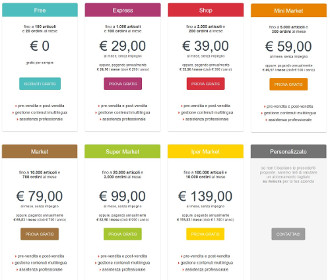The integration with Magento is available for versions starting from 1.9
The coverage of integration is very wide, both for products and for orders, in both directions: the service allows you to publish your product catalog on Magento, but also to use Magento as a data source to go to other systems (such as marketplaces). Orders can be picked up from Magento in order to be sent to external systems (e.g. ERP), or it is possible to manage integration in the opposite direction, by centralizing the orders on the Magento panel.
After developing the first integration using the Magento API, in order to improve communication performance, we migrated to proprietary scripts capable of publishing thousands of products in a few minutes. The management of the unloading and updating of orders is still managed today through the native Magento API.
You can request that the initial configuration service be performed on a project basis by the bindCommerce team. We invite you to contact us to find out more about your needs.
Magento, e-commerce for very demanding people
Magento is an open-source e-commerce platform launched in 2007 by Varien, subsequently purchased by eBay and later by Adobe, is currently among the most popular online solutions, competing directly with similar solutions such as WooCommerce and PrestaShop.
What makes Magento different?
Unlike more immediately accessible solutions even to those who are taking their first steps in the world of digital shopping, Magento offers even complex technical solutions, with a specific focus on shop management through data analysis, order management and customers, developing customized solutions for security, payment and more.
In essence it is a professional resource that offers the maximum benefit to customers who have large databases in terms of products and customers, or who want to take advantage of a scalable solution that allows for sustainable future growth.
Big players, but not only
Thanks to these features and the open-source nature that offers excellent guarantees of safety, the platform is actively used by huge multinationals such as Nike , Samsung and Ford , positioning itself as one of the main business and corporate resources in the e-commerce sector.
Its huge diffusion, however, has also allowed the spread of simplified and accessible solutions to anyone, such as pre-set graphic templates, customizable extensions and automated management solutions.
Can it be the right solution for you?
As in most of the questions of this life, also in e-commerce, the answer that dominates most of all is always the same: it depends.
The important elements to consider are basically two:
1) your degree of technical knowledge like programming and design;
2) the actual volume of business that will be conducted through e-commerce.
The first point is relevant for the personalization of the store; by its very nature Magento cannot offer the same simplicity of graphic customization that an e-commerce based on WordPress can offer, for example. The learning curve, although not insurmountable, is certainly consistent and could prove to be burdensome in daily management.
The second point is also important for evaluating which resources you will actually need in terms of web space. Magento requires resources higher than those of a site developed, for example, with PrestaShop; in the same way the cost of hosting can be more expensive.
Scalability
Ultimately Magento is an effective solution that requires more resources, both technical and economic, while offering ample and sustainable growth margins; a business solution in all respects, without the initial costs which instead could be incurred with solutions such as Oracle or custom solutions.
Thank you for rating this article.







